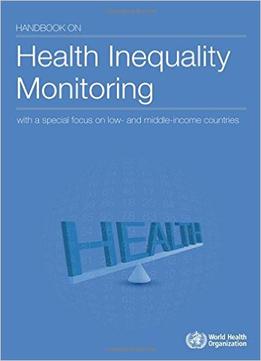
Handbook On Health Inequality Monitoring: With A Special Focus On Low- And Middle-Income Countries
by World Health Organization /
2013 / English / PDF
5.8 MB Download
Monitoring health inequality is a practice that fosters accountability and continuous improvement within health systems. The cycle of health inequality monitoring helps to identify and track health differences between subgroups, providing evidence and feedback to strengthen equity-oriented policies, programs and practices. Through inequality monitoring and the use of disaggregated data, countries gain insight into how health is distributed in the population, looking beyond what is indicated by national averages. Data about health inequalities underlie health interventions that aim to reach vulnerable populations. Furthermore, they constitute an evidence base to inform and promote equity-oriented health initiatives, including the movement towards equitable universal health coverage. This Handbook is a user-friendly resource developed to help countries establish and strengthen health inequality monitoring practices. The handbook elaborates on the steps of health inequality monitoring, including selecting relevant health indicators and equity stratifiers, obtaining data, analyzing data, reporting results and implementing changes. Throughout the handbook, examples from low- and middle-income countries are presented to illustrate how concepts are relevant and applied in real-world situations; informative text boxes provide the context to better understand the complexities of the subject. The final section of the handbook presents an expanded example of national-level health inequality monitoring of reproductive, maternal and child health.











